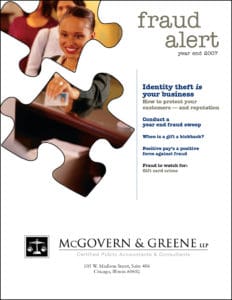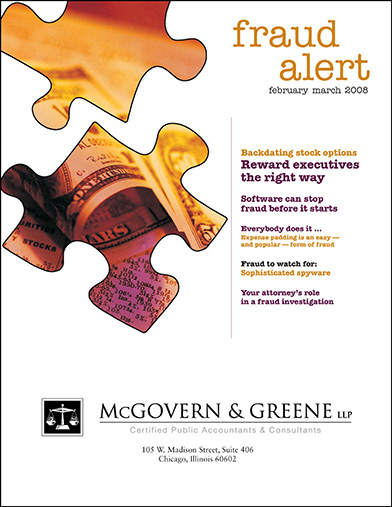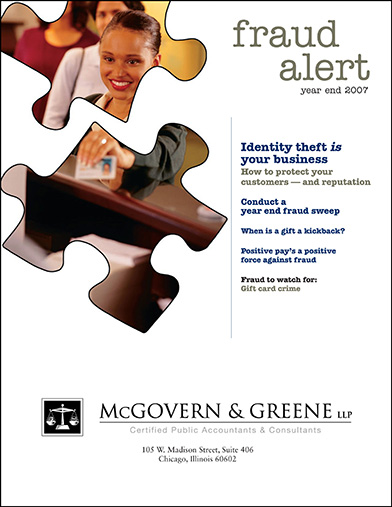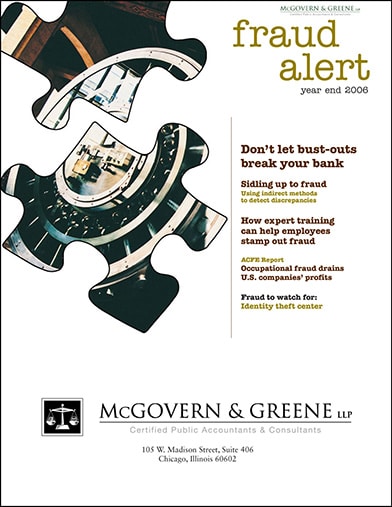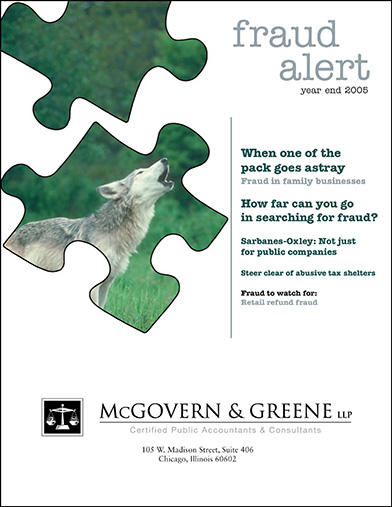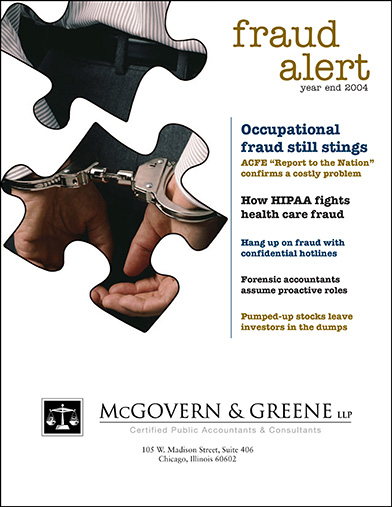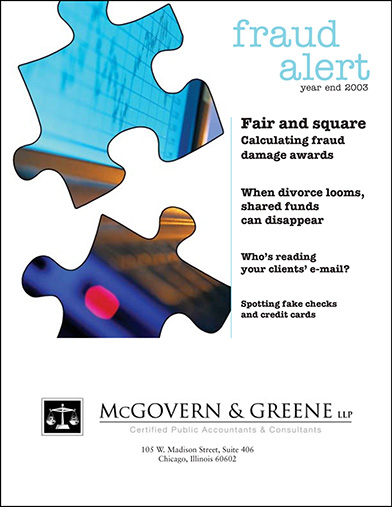Fraud Alert Magazine

YEAR END 2007 Issue of Fraud Alert
Identity theft is your business
How to protect your customers — and reputation
Identity theft — especially when perpetrated through credit card fraud — isn’t only a concern for consumers. It’s also a giant headache for businesses. But there are several inexpensive steps they can take to protect their customers, employees, vendors and reputation. These include inventorying all computers and electronic equipment, destroying personal information that isn’t necessary and using passwords to restrict access to sensitive computer files.
Conduct a year end fraud sweep
Companies can help start the new year right before it even begins by performing a fraud protection analysis. A thorough, objective year end review can unveil suspicious losses and fraud weaknesses. This article encourages businesses to enlist the help of a CPA to perform a financial audit. It also advises owners to look for telltale signs of fraud such as missing documents, excessive journal entries and unusual employee behavior.
When is a gift a kickback?
This article explains the difference between gifts and kickbacks. As long as tokens of appreciation don’t come with strings attached, they’re generally considered gifts. If, on the other hand, they’re meant to induce or reward favors or special treatment, even nominal gifts become kickbacks — and may be illegal. Businesses are encouraged to adopt a zero-tolerance gift policy to show they’re committed to the highest level of legal and ethical standards.
Positive pay’s a positive force against fraud
Positive pay — and reverse positive pay — systems have become the No. 1 defense against check fraud in the United States. But not all positive pay systems are created equal. When enterprising thieves change payee names without altering the check amounts, standard positive pay systems won’t catch them. Businesses, therefore, are advised to consider payee positive pay, which compares payee names as well as check numbers and amounts.
Fraud to watch for: Gift card crime
This short article explains how organized crime is using “open” gift cards — or those with no load limit — as currency. Businesses should, therefore, reward employees and customers with “closed” gift cards that can only be used with the retailers that issue them.
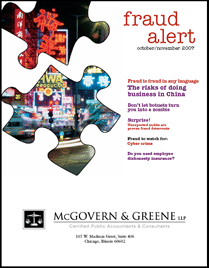 OCT/NOV 2007 Issue of Fraud Alert
OCT/NOV 2007 Issue of Fraud Alert
Fraud is fraud in any language
The risks of doing business in China
China offers plenty of opportunities for American businesses looking for lucrative new markets. But in some cases, the desire to get rich quick coupled with rudimentary government regulations has encouraged fraud. This article discusses common Chinese fraud schemes, such as falsifying production records and collusion with, or bribery involving, government officials. It encourages companies to carefully investigate Chinese business partners, install at least one expatriate manager to monitor daily activities, and implement strong internal controls.
Don’t let botnets turn you into a zombie
Botnets — sophisticated software robot networks — are dangerous and spreading. This article talks about how malicious botnet programs install themselves and turn host computers into “zombies” that send spam and spread viruses. Botnets can target critical operations and botnet operators can even use the software to launch “denial of service” attacks on companies unless they’re willing to pay thousands of dollars in protection money.
Surprise!
Unexpected audits are proven fraud deterrents
According to the Association of Certified Fraud Examiners, businesses that are fraud victims report significantly lower losses and shorter-lived fraud schemes if surprise audits are part of their antifraud programs. This article explains that surprise audits generally are limited in scope and focus on higher-risk areas, such as expense reports, cash or purchasing. This means they don’t have to be expensive to be effective.
Fraud to watch for: Cyber crime
This short article introduces the new Department of Homeland Security’s National Computer Forensic Institute, which is designed to give police officers, judges and prosecutors the tools and skills necessary to combat computer-related crime.
Do you need employee dishonesty insurance?
The problem of internal theft is so widespread that insurance companies offer employee dishonesty coverage to protect businesses against loss of money, bonds or property due to criminal acts by employees. This can be valuable protection, but, before companies buy a policy, they need to understand what they’re getting. Not all losses are covered, including the unexplained disappearance of property, and the loss of employees’ property.
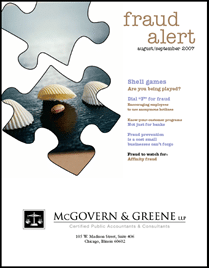 AUG/SEP 2007 Issue of Fraud Alert
AUG/SEP 2007 Issue of Fraud Alert
Shell games
Are you being played?
Shell companies — businesses with no assets of their own — can serve legitimate business purposes, such as holding another company’s assets. But they also can be used to perpetrate fraud. This article explains how dishonest employees might set up shell companies and use them to send and collect on fictitious bills. It also explains how business owners can spot and prevent such schemes.
Dial “F” for fraud
Encouraging employees to use anonymous hotlines
Anonymous hotlines have been demonstrated to be cost-effective and successful mechanisms for detecting occupational fraud, but companies can’t just build them and expect tips to come. This article talks about how businesses should properly establish and maintain an anonymous hotline. This includes making the hotline available 24 hours a day, seven days a week, and educating employees about what information they need to provide when calling.
Know-your-customer programs: Not just for banks
Under the Bank Secrecy Act, banks and other federally regulated businesses are required to implement know-your-customer (KYC) programs to help ensure their customers are who they say they are. But even when they’re not required, KYC measures can be useful to other types of businesses. They can help businesses avoid falling victim to phoenix companies and other types of fraud. And by creating a comprehensive history of each customer’s credit limits and transactions, businesses can identify their top customers and expose potential financial risks.
Fraud prevention is a cost small businesses can’t forgo
Small business owners may know that they’re vulnerable to fraud but not have the staffing or financial resources to implement a fraud-prevention program. Even small businesses with limited resources, however, can take steps to prevent falling victim. These include working with an accountant to determine possible risks, learning to recognize the warning signs of fraud and putting in place internal controls.
Fraud to watch for: Affinity fraud
As this short article explains, con artists with an affinity for big swindles often find the best pickings among members of their own demographic groups. Some fraudsters prey on the unwary by exploiting connections of race, religion, age, politics, profession or other common bonds, in scams that can involve Ponzi and pyramid schemes.
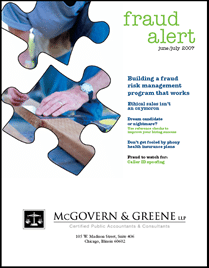 JUN/JUL 2007 Issue of Fraud Alert
JUN/JUL 2007 Issue of Fraud Alert
Building a fraud risk management program that works
This article discusses the importance of building a fraud risk management plan and how businesses can go about it. This includes writing codes of ethics and business conduct and re-evaluating internal controls already in place. Once they’ve identified areas of risk to be addressed, companies are encouraged to prioritize so that they might allocate resources most effectively.
Ethical sales isn’t an oxymoron
To preserve their good name, companies can’t overlook their sales force when building an ethical business culture. This article explains that leaders must try to anticipate the challenges their sales force face as it attempts to meet sales goals and ensure these challenges don’t contribute to unethical behavior or activities that threaten the business’s credibility. Policies such as volunteering information about a product’s limitations are important to consider.
Dream candidate or nightmare?
Use reference checks to improve your hiring success
The article explains how companies can maximize reference checks to ensure they’re hiring the best job candidates. The process should begin as early as the interview stage, where interviewers can gather the names of individuals who have worked with the candidate. While companies should call the references a candidate provides, names not on the candidate’s list may be able to provide specifics on the extent to which the candidate was responsible for a project’s outcome and how well he or she work with others.
Don’t get fooled by phony health insurance plans
Health insurance scam artists take advantage of the fact that companies are under pressure to keep costs in line. They may offer deep-discounted coverage with generous benefits and few or no underwriting standards. Everything may seem legitimate until employees submit claims. Then business owners and their employees are left with nonexistent coverage and unpaid health care bills. This article lists several signs of a fraudulent insurance plan.
Fraud to watch for: Caller ID spoofing
This short article discusses the latest phone-based scam — caller ID spoofing. Fraudsters use readily available and inexpensive software to make any number they choose appear on a phone’s caller ID display, and then attempt to obtain Social Security and bank account numbers from the call recipient.
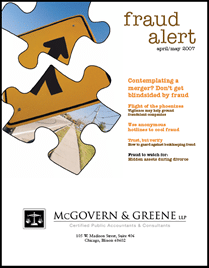 APR/MAY 2007 Issue of Fraud Alert
APR/MAY 2007 Issue of Fraud Alert
Contemplating a merger? Don’t get blindsided by fraud
With investors, lenders and other stakeholders skittish in the wake of corporate accounting scandals, it’s more important than ever that companies know whom they’re merging with. Forensic accountants can help with pre-merger due diligence, which includes an assessment of the target company’s corporate culture and intensive scrutiny of financial, tax, loan and regulatory records. These experts look, in particular, for anything that creates an inaccurate picture of a company’s true value, such as hidden liabilities and overvalued receivables.
Flight of the phoenixes
Vigilance may help ground fraudulent companies
Some business owners take advantage of bankruptcy laws by running a company into the ground to avoid liabilities, or transferring assets to a new “phoenix” company at below-market value shortly before or immediately after the demise of the original business. While phoenix companies are becoming less common as tighter regulations force more accurate financial reporting, it’s still possible to become victim to this type of fraud. This article provides tips on how potential customers and suppliers can avoid doing business with these types of companies.
Use anonymous hotlines to cool fraud
Even though private companies aren’t required to implement fraud hotlines, they’re doing a disservice if they don’t: Organizations with hotlines cut their annual fraud losses in half. This article explains how to set up and maintain an effective anonymous reporting system, including how to publicize its existence to employees and other concerned parties.
Trust, but verify
How to guard against bookkeeping fraud
Bookkeepers — particularly those in small and midsize businesses — are ideally positioned to embezzle from their employers. This article lists some of the methods a bookkeeper might use to commit occupational fraud, by, for example, including a “less cash” amount when depositing checks or through outright forgery. It also suggests ways to guard against bookkeeper fraud by segregating duties and requesting an outside auditor to review financial records regularly.
Fraud to watch for: Hidden assets during divorce
This short article discusses the ways divorcing spouses sometimes attempt to hide divisible assets. These include keeping cash in traveler’s checks, delaying business contracts or bonuses, and failing to reveal the existence of retirement accounts or stock options.
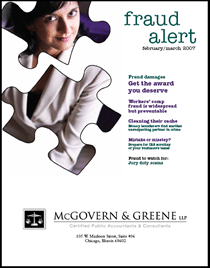 FEB/MAR 2007 Issue of Fraud Alert
FEB/MAR 2007 Issue of Fraud Alert
Fraud damages
Get the award you deserve
When a business or individual has been the victim of fraud, it’s only fair that the perpetrator be required to repay what was stolen. Courts may — and in some states must — order restitution, but it isn’t always easy for judges to decide how much a company has actually lost. Forensic accountants can help work with the victim’s attorney to calculate damages and prepare presentations that convince judges to accept the results.
Workers’ comp fraud is widespread but preventable
Workers’ compensation fraud costs American employers millions of dollars a year. But workers aren’t the only ones perpetrating it; health care providers and insurance carriers also can participate in this type of fraud. This article explains how workers’ comp schemes typically play out and provides a list of signs that claims aren’t legitimate.
Cleaning their cache
Money launderers find another unsuspecting partner in crime
Money laundering is big business, but it often relies on small businesses to succeed. Money service businesses (MSBs) that cash checks, issue or redeem traveler’s checks or money orders, or transmit money are among the most frequently used conduits for money laundering. This article explains how launderers use MSBs and what the federal government is doing to prevent these abuses.
Mistake or misstep?
Prepare for IRS scrutiny of your business’s taxes
Given the complicated nature of U.S. tax laws, it’s almost inevitable that mistakes creep into business tax returns. The challenge is to convince the IRS that errors are, indeed, errors and not attempts to cheat. This article suggests ways to avoid the kinds of mistakes that typically trigger an audit. It also helps businesses prepare for and survive an audit, should it become necessary.
Fraud to watch for: Jury duty scams
This short article discusses jury duty scams. This is a type of identity theft in which scammers purporting to be local court employees call unsuspecting victims and warn them they are about to be arrested because they haven’t reported for jury duty. To steal victims’ Social Security numbers and dates of birth, the thieves demand this information to “verify their records.”
This publication is distributed with the understanding that the author, publisher and distributor are not rendering legal, accounting or other professional advice or opinions on specific facts or matters, and, accordingly, assume no liability whatsoever in connection with its use.
GFAS Fraud Alert Archives
Expert Forensic Accounting Services
Chicago | Las Vegas
FORENSIC ACCOUNTING
SERVICES
Insurance Claims
Accounting Investigations
Mergers & Acquisitions
Due Diligence Reviews
Dispute Advisory Services
Special Examinations
Contract Audits and Recoveries
LITIGATION SERVICES
Expert Witness Testimony
Commercial Damages
Shareholder/Partner Disputes
Bankruptcy and Insolvency
CPA Malpractice Claims
Contract Disputes
Estate and Trust Disputes
Data Mining & Electronic Discovery
FRAUD EXAMINATIONS

